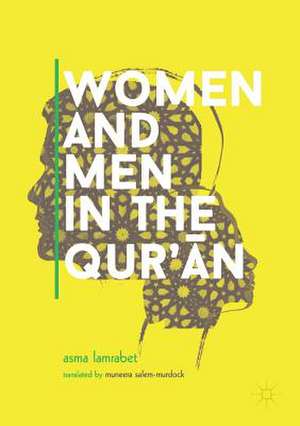Women and Men in the Qur’ān
Autor Asma Lamrabet Traducere de Muneera Salem-Murdocken Limba Engleză Paperback – 5 mai 2018
Preț: 229.87 lei
Nou
Puncte Express: 345
Preț estimativ în valută:
43.100€ • 47.81$ • 36.98£
43.100€ • 47.81$ • 36.98£
Carte tipărită la comandă
Livrare economică 21 aprilie-05 mai
Preluare comenzi: 021 569.72.76
Specificații
ISBN-13: 9783319787404
ISBN-10: 3319787403
Pagini: 195
Ilustrații: X, 195 p.
Dimensiuni: 148 x 210 x 16 mm
Greutate: 0.25 kg
Ediția:1st ed. 2018
Editura: Springer International Publishing
Colecția Palgrave Macmillan
Locul publicării:Cham, Switzerland
ISBN-10: 3319787403
Pagini: 195
Ilustrații: X, 195 p.
Dimensiuni: 148 x 210 x 16 mm
Greutate: 0.25 kg
Ediția:1st ed. 2018
Editura: Springer International Publishing
Colecția Palgrave Macmillan
Locul publicării:Cham, Switzerland
Cuprins
Chapter 1 Introduction.- Chapter 2 Beyond the Problematic of “the Muslim Woman”.- Chapter 3 The Qur’ānic Revelation in Seventh Century Arabia.- Chapter 4 An Alternative Approach to the Qur’ān.- Chapter 5 The Creation of Humanity.- Chapter 6 The Construction of Human Civilization.- Chapter 7 Moral Integrity as an Evaluation Criteria.- Chapter 8 The Egalitarian Call of the Qur’ān.- Chapter 9 The Qur’ānic Ethic of the Marital Union.- Chapter 10 The Principles of Divorce in the Qur’ān.- Chapter 11 The Shared Responsibility of Men and Women.- Chapter 12 The Management of Public and Private Spheres.- Chapter 13 The Basic Verses on Inheritance.- Chapter 14 Foundations of Corporal Ethic.- Chapter 15 The Equality of In-Court Testimony.- Chapter 16 Why Is There a Lag?.- Chapter 17 What Alternative Possibilities?.- Chapter 18 Equality, the Time of a Revelation.
Notă biografică
Asma Lamrabet is the author of several books on the position of women in Islam, and has lectured widely on the topic. Her writings include Women in the Qur’an: An Emancipatory Reading (2016), and she received the Social Sciences Award in 2013 by the Arab Woman Organization. Dr. Lamrabet was the Director of Studies at the Research Center on Women’s Issues in Islam (centre d'études féminines en Islam/ Rabita al muhammadia des Oulémas du Maroc) for ten years. She lives and works in Rabat, Morocco, her birthplace.
Muneera Salem-Murdock was the Millennium Challenge Corporation’s Resident Country Director in Morocco for 7 years and has served as Senior Development Policy Advisor to the U.S. Executive Director at the World Bank and Senior Policy Analyst at USAID. She has worked extensively in Africa and the Middle East and has lectured widely on a variety of topics. She is the author of Arabs and Nubians in New Halfa: A Study of Settlement and Irrigation (University of Utah Press, 1989), co-author of Les Barrages de la Controverse: le cas de la Vallée du Fleuve Sénégal (1994), editor of Anthropology and Development in North Africa and the Middle East (1990), and contributor to several volumes including Anthropological Approaches to Resettlement: Policy, Practice, and Theory (1993), and Lands at Risk in the Third World (1987).
Textul de pe ultima copertă
This book distinguishes Islam as a spiritual message from the sociopolitical context of its revelation. While the sacred text of the Quran reveals a clear empowerment of women and equality of believers, such spirit is barely reflected in the interpretations. Trapped between Western rhetoric that portrays them as submissive figures in desperate need of liberation, and centuries-old, parochial interpretations that have almost become part of the “sacred,” Muslim women are pressured and profoundly misunderstood. Asma Lamrabet laments this state of affairs and the inclination of both Muslims and non-Muslims to readily embrace flawed human interpretations that devalue women rather than remaining faithful to the meaning of the Sacred Text. Full of insight, this study carefully reads the Qur’an to arrive at its deeper spiritual teachings.
Caracteristici
Highlights the importance of distinguishing Islam as a spiritual message from Islam as a culture. Promotes a message of gender equality in Islam. Speaks to (and against) the increasingly widespread Islamophobia.
